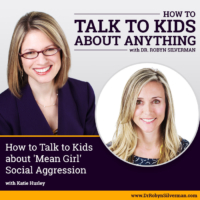Podcast: Play in new window | Download
Subscribe: Apple Podcasts | RSS | More
How to Talk to Kids about Stress Management
This podcast will focus on talking to kids about stress management and providing important stress-management tools children can use during all kinds of stress-provoking times in their lives. From dealing with bedtime to going to school, taking a tough test of needing to make an important contribution during a sport or activity, these techniques can be applied! Lori Lite provides tools, steps and scripts to help prepare kids to cope with stress and also help them to reduce stress—before it gets the best of them! And guess what? Parents and other key adults can use them too!
Special Guest: Lori Lite
More and more, kids are feeling stressed out in today’s world. This is a topic that comes up often- and of course it does, between academics, sports, homework, performance, lack of free play, reduced recess, political unrest, overworked parents and more, kids are being pulled in many directions and so are parents. Stress is part of the landscape in many families. It’s a great privilege to be able to call on the parenting experts who study stress and stress management as a living to help us know what to do, how to stay calm and how to help our kids with stress management.
Lori Lite is a mom, author, and founder of Stress Free Kids. Her titles, CDs and curriculum help parents and children struggling with stress, anxiety, and anger. Her award-winning titles are a resource for parents, psychologists, therapists, child life specialists, and teachers. Lori has appeared on ABC’s Shark Tank and has been named a Top 100 Parenting Expert to follow on Twitter. Her recent book, Stress Free Kids: A Parent’s Guide has been named Top 10 Inspirational Books and Lori has just released her first coloring book, Angry Octopus Color Me Happy, Color Me Calm. (Which I have next to me and will be using with my own children)
The podcast provides:
- Tips: The top tips to help someone calm down.
- How to breathe to reduce stress- and make it fun!
- How affirmations can help keep calm down.
- How to help your child to identify when they are starting to get stressed-out.
- How to incorporate emotional awareness and skills into everyday practice.
- How to be a good model for how to handle stress in healthy ways.
- How to turn a stressful moment into a time to show gratitude.
- Steps to help your child feel calm before bedtime so that they can fall asleep easier.
- Scripts to say when your child is feeling stress-out—or what to say before to practice stress-management skills.
Important Messages:
- Laughter, breathing and affirmations can all help children to calm down.
- Work with your child to create emotional awareness and emotional intelligence.
- It’s important to give children the words to talk about all different kinds of emotions- including “stressed-out.”
- Overscheduling can be a big stresser. It’s important to check-in with your child to ensure that they are not overwhelmed and over-stressed.
- Music can be a great stress-management tool- try different kinds of music and see how it affects your child.
- Use positive words to prepare your child for something that can stress a child out.
- Allow your child to be the one to say good-bye instead of you saying good-bye to your child.
- Allow your child to find some control in a stressful situation.
- Provide a good example of handling stress—using tools that calm you down.
- A parent can say; “I’m getting stressed-out and I’m going to do my breathing right now.”
- Gratitude can help reduce stress—especially in a particularly stressful moment.
- Come up, together, with some stress-management tools to put in your child’s room as a relaxation space- so that your child can use it when in need.
Notable Quotables:
- “Laughter is a great stress buster!”
- “I think it’s great to raise children with their own little set of go-to tools that they can help develop with their parents.”
- “Children are often taught what it means to be tired, sad, happy. But they aren’t often taught what stressed-out means. It’s not often given to children as one of their emotional words. It’s really important to give children the words for all of their emotions. So when they are stressed-out they have the words to say, ‘I’m stressed-out.’”
- “Parents need to help children identify when they are feeling stressed, give them the tools and make the adjustments to accommodate their child’s needs.”
- “You can not teach stress-management skills in the middle of the storm. Practice the techniques when the child is calm, it becomes easier for them to apply it when they start to feel themselves escalate.”
- “It’s super important for children to see their parents managing stress in healthy ways.”
- “Stress and gratitude can not exist in the same moment.”
- “Parents should rely on their intuition and creativity and know in their core that they and their children can be active participants in creating their own joyful collection of stress-free moments.”
Resources:
- Stressfreekids.com
- ABC’s of Decreasing Stress
- @StressFreeKids on Twitter
- Angry Octopus Color Me Happy, Color Me Calm: A Self-Help Kid’s Coloring Book for Overcoming Anxiety, Anger, Worry, and Stress
- Stress Free Kids: A Parent’s Guide to Helping Build Self-Esteem, Manage Stress, and Reduce Anxiety in Children
- Angry Octopus: An Anger Management Story introducing active progressive muscular relaxation and deep breathing
- Sea Otter Cove: Introducing relaxation breathing to lower anxiety, decrease stress and control anger while promoting peaceful sleep
- A Boy & a Bear: The Children’s Relaxation Book
- Indigo Dreams: Relaxation and Stress Management Bedtime Stories for Children, Improve Sleep, Manage Stress and Anxiety
- Affirmation Weaver: A Believe in Yourself Story, Designed to Help Children Boost Self-esteem While Decreasing Stress and Anxiety
- Bubble Riding: A Relaxation Story designed to teach children visualization techniques to increase creativity while lowering stress and anxiety levels
- The Goodnight Caterpillar: A Children’s Relaxation Story to Improve Sleep, Manage Stress, Anxiety, Anger








